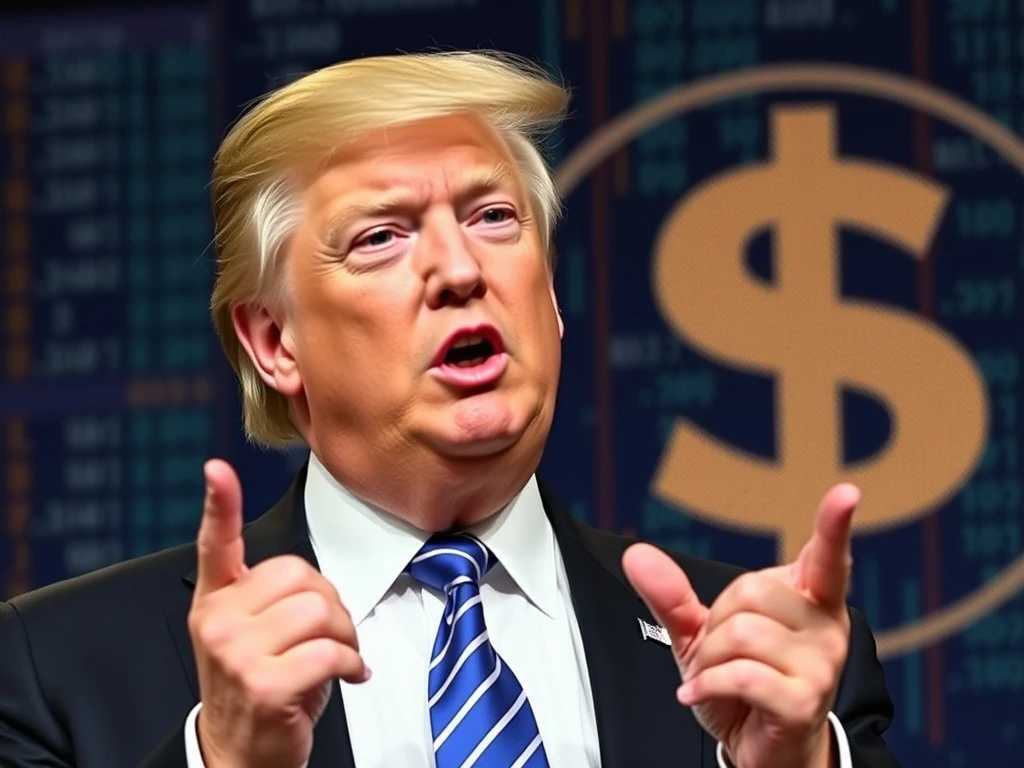Stablecoins: Eric Trump Crucially Defends US Dollar’s Future Amidst Crypto Ventures

Stablecoins, digital assets pegged to a stable reserve like the US dollar, are sparking intense debate. Eric Trump, son of former US President Donald Trump, recently made a bold claim: stablecoins could “save the US dollar.” This assertion comes amidst growing scrutiny of the Trump family’s extensive crypto ventures and their potential influence on crypto regulation.
Eric Trump Crypto Ventures Face Scrutiny
Eric Trump, a prominent businessman with significant stakes in crypto ventures, firmly believes in the power of stablecoins. In a recent interview with The New York Post, he expressed conviction that these digital assets will “save the US dollar.” He specifically highlighted USD1, a stablecoin linked to World Liberty Financial (WLFI), a Trump family crypto project. This project, however, has drawn considerable attention and criticism since its plans emerged in late March. Many observers quickly raised conflict of interest concerns.
The Trump family’s involvement in the crypto space has intensified discussions around political ethics. The introduction of USD1, in particular, sparked immediate questions about its implications. Critics argue that a project directly tied to a former president, especially one with potential future political aspirations, creates inherent risks. Consequently, the debate extends beyond mere financial innovation, touching upon governance and transparency.
Mounting Concerns Over Crypto Regulation and Influence
Critics quickly voiced strong objections to the Trump family’s crypto endeavors. Attorney Andrew Rossow, for example, described the stablecoin as “a direct affront to constitutional safeguards meant to prevent conflicts of interest.” The political sphere also reacted. In April, US Representative Maxine Waters, a ranking member of the US House Financial Services Committee, speculated on broader intentions. She suggested Donald Trump might aim to replace the US dollar with his own stablecoin across government payments. These payments could range from housing subsidies to Social Security benefits and tax collections. This concern underscored the perceived risks of a sitting president having direct financial ties to a private digital currency.
Furthermore, the notion of a private stablecoin potentially supplanting the national currency raised alarms about monetary sovereignty. Many lawmakers questioned the implications for economic stability and national security. The public discussion intensified, highlighting the delicate balance between fostering innovation and safeguarding established financial systems. Therefore, calls for robust crypto regulation became louder and more urgent.
The GENIUS Act and Political Ramifications for Trump Family Crypto
Further amplifying these concerns, five Democratic senators issued a letter in March. They warned that a president’s direct financial stake in a stablecoin posed “unprecedented risks to our financial system.” Despite these warnings, the Trump administration moved forward with US stablecoin regulation. President Trump signed the GENIUS Act into law on July 18. Soon after, reports indicated President Trump’s personal fortune grew by approximately $2.4 billion from his crypto-related ventures since 2022. This financial growth, coinciding with regulatory developments, intensified the debate.
Later, in early August, crypto-skeptic US Senator Elizabeth Warren, joined by Senators Chris Van Hollen and Ron Wyden, formally addressed the Office of the Comptroller of the Currency. Their letter explicitly raised concerns about potential conflicts of interest involving the Trump family’s crypto business interests. They noted the recently approved stablecoin law “does nothing to prevent President Trump, his family, or his affiliates from financially benefiting from the issuance and sale of stablecoins.” This legislative loophole, according to critics, left ample room for ethical quandaries.

Stablecoins’ Potential to Bolster the US Dollar
Despite the political controversy, Eric Trump is not alone in his view regarding stablecoins and the US dollar. Many experts also believe stablecoins can strengthen the dollar’s global position. For instance, Federal Reserve Bank Governor Christopher Waller expressed support for stablecoin adoption in February. He argued they “will broaden the reach of the dollar across the globe and make it even more of a reserve currency than it is now.” This perspective highlights the potential for stablecoins to extend the dollar’s influence in the digital age.
Similarly, LayerZero Labs founder and CEO Bryan Pellegrino stated in early April that stablecoins offer the US government the best tool to maintain the US dollar’s hegemony in global financial markets. He controversially described stablecoins as potentially “the last Trojan Horse or vampire attack on every single other currency in the world.” These proponents view stablecoins as a strategic asset for national economic power. They suggest that embracing these digital assets could secure the dollar’s long-term dominance against emerging digital currencies.
Divergent Views on Stablecoins and Global Currency Dynamics
However, not everyone agrees that stablecoins will unequivocally benefit the US dollar. European asset manager Amundi, for example, suggested in early July that friendlier stablecoin regulation could paradoxically threaten the dollar’s long-term dominance. This perspective highlights a complex interplay of factors influencing global currency dynamics. The concern here is that a fragmented global stablecoin market, even if dollar-pegged, might dilute the direct influence of the US central bank.
An ECB adviser also noted Europe risks US dollar dominance without common stablecoin rules. This indicates a broader international competition in the digital currency space. The debate continues: will stablecoins truly “save the US dollar” or introduce new challenges to its global standing? The future of crypto regulation will undoubtedly shape this outcome, impacting both the financial landscape and political discourse. Ultimately, policymakers face the intricate task of balancing innovation with stability, ensuring the dollar’s enduring strength.








